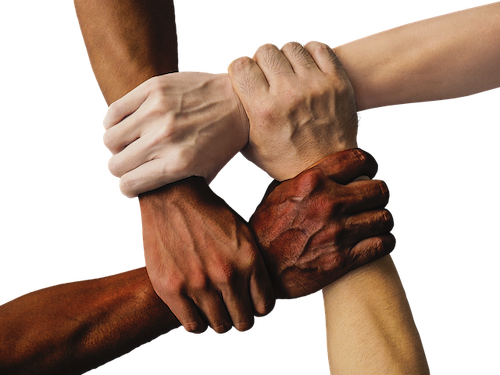
Invoking Culture Change
“I thank God that Thou hast not made me a Gentile, a slave, or a woman.”[1] This was a common Jewish prayer recited in the first century. It made clear the pecking order at that time. As a woman and a Gentile, I would have been considered the lowest of the low.
What is your reaction to this prayer? Perhaps it’s one of the following:
Oh, that’s horrible.
How bigoted.
How unbelievably biased.
I’m so glad times have changed.
To that last response I ask, “Have they? Have times really changed?”
The apostle Paul addressed the crassness of this caste system in his letter to the churches of Galatia:
“For you are all sons [children] of God through faith in Christ Jesus… There is neither Jew nor Gentile, there is neither slave nor free man, neither male nor female; for you are all one in Christ Jesus.” (Gal. 3:26, 28 NASB [NLT])
Paul slashed through the distinctions of the time and he would have jolted his listeners.
Sure, as believers in Jesus their hearts had been changed, but their culture had not, and it’s hard to go against culture. A person generally doesn’t like to stand out, make waves, or invoke culture change.
Even the apostle Peter was having issues with this “equality in Christ” thing, and Paul called him out on it. One chapter prior, in Galatians 2:11–14, Paul explains that Peter used to eat with the Gentiles, but when his Jewish buddies showed up, he began to withdraw. He, a Jew, couldn’t be seen eating with Gentiles. Oh, the scandal!
And Peter’s hypocritical behaviors influenced other Jewish believers as well, even the faithful and fellow missionary, Barnabas.
The Jewish believers’ hearts had been changed by Jesus, but their culture had not, and people generally doesn’t like to stand out, make waves, or invoke culture change.
Paul, however, didn’t care. He was going to tell the truth, and the truth was that—in Christ—there was no longer superiority. Men were not superior to women. Free persons were not superior to slaves. Jews were not superior to Gentiles.
One chapter later Paul throws down the gauntlet by saying, “You are fully adopted as sons, with all the rights and privileges. You are heirs, deserving of full inheritance.” (Gal. 4:5–7 paraphrase mine.) Inheritances passed from fathers to sons, never to daughters. For slaves, even if they had a child, the child belonged to their master, not to the slave. Paul was delivering a shocking message. Regardless of status, ethnicity, gender, or religious background, they were all one adopted-in-Christ family.
Paul was standing out, making waves, and invoking confrontation for culture change.
Why am I writing this? With the Western world in a divisive political and racial uproar, I hope you’re starting to get a clue. If I was to take that Jewish prayer and change it for today I might say,
“I thank God that Thou hast not made me a Black, a Hispanic, or an immigrant.”
What is your reaction to this revised prayer?
You’re being unreasonable.
You’ve taken it too far.
It’s not a church problem.
People just need Jesus.
Let me address the last two points in reverse order.
First, people do need Jesus, yes. However, the apostle Peter “had Jesus,” and he was unwilling to stand out, make waves, or invoke confrontation for culture change. And if I told you some of the ways my Mexican husband and other Hispanic believers have been mistreated by people who “have Jesus” you would probably be shocked. (At least, I would hope you’d be shocked.)
Second, if it’s not a church problem, then whose problem is it? Believers in Jesus are the only ones capable of unity and oneness because of the very reasons Paul stated. If we, who have Jesus, cannot and will not stand up for our mistreated brothers and sisters in Christ, then who will?
I get it. You don’t like to stand out, make waves, or invoke confrontation in your church culture. I don’t either. I recently made a statement on Social Media in an attempt to stand with my African American brothers and sisters and received backlash from a few people. It was uncomfortable—for a day.
However many of our brothers and sisters are uncomfortable every day of their lives because those of us with privilege refuse to stand up for them.
Our reasons for not standing up vary. Sometimes it’s because we are not aware that the culture is wrong. (We don’t know what we don’t know.) Sometimes we simply don’t know what to say or do, fearing we might say or do the wrong thing. Other times it’s because the issue does not affect us personally. And other times it’s because we agree with the culture. (Ouch.)
But if Paul was okay with significant discomfort we should be, too.
I invite you to consider the following practical ways to diversify your church or ministry leadership:
- Take a look at your elder board. If your church has a Hispanic ministry, for example, is there a Hispanic elder? If your church has a Chinese ministry, is there a Chinese elder?
- Take a look at the diversity (or the lack thereof) of your church staff. I recently surveyed the staff listings of several churches in my area. More often than not, the only Hispanic employed was in the maintenance department. There were zero African Americans and no Asians.
- Take a look at the roles of women in your church. Are women only serving as administrative assistants and children’s ministry coordinators? There are other potential leadership roles that do not conflict with Complementarian views. Are women’s voices heard or taken into consideration at the leadership and decision-making levels? Demographically women make up half the church.
- Take a look at the signage in your church. If you have a secondary language regularly meeting in your church, have you considered at least having the “Welcome” signage in that second language?
- Take a look at your mission trip practices. If you regularly send your youth groups to Latin American countries on mission trips, have you considered asking those from Latin America in your congregation to help give lessons in cultural intelligence prior to embarking on the trip?
- Take a look at the leadership training options for your staff. Consider having pastors from predominantly African American, Asian, or Hispanic churches join you and discuss how you all can band together to support the community (and then act on that discussion).
Let’s start to stand out, make waves, and invoke culture change. Let’s show the world that having Jesus makes what Paul stated as true, “We are all one in Christ Jesus”, and when something happens to our African American brother, it happens to us. When something happens to our Hispanic sister, it happens to us. And when something happens to our Asian brothers, it happens to us—because being one adopted-in-Christ family should mean something.
“I thank God that Thou hast made us a multi-racial, multi-ethnic, multi-cultural family in Christ.”
Additional Resources: I still have much to learn, and this article has only scratched the surface. I plan on using the following biblical resources, perhaps you’ll join me?
Messages on the recent social injustices from:
- Dr. Tony Evans, Oak Cliff Bible Fellowship
- Dr. Eric Mason, Lead Pastor of Epiphany Fellowship Church
- Pastor Brian Carter, Senior Pastor of Concord Church
Podcasts, Chapel Messages, and DTS Magazine articles on related diversity topics compiled by Dallas Theological Seminary.
Resources to Fuel Change by MOPS International.
Ten Things Every Racial Bridge-Builder Should Know by Tasha Morrison, founder of Be The Bridge.
[1] Donald K. Campbell, “Galatians,” in The Bible Knowledge Commentary: An Exposition of the Scriptures, ed. John F. Walvoord and Roy B. Zuck, 2 vols. (Wheaton, IL: Victor Books, 1983–1985), 600.



